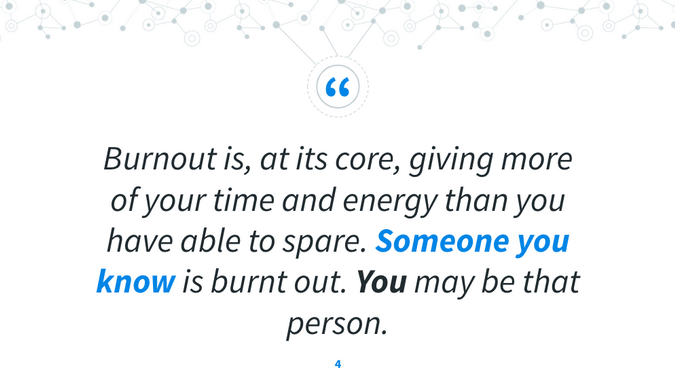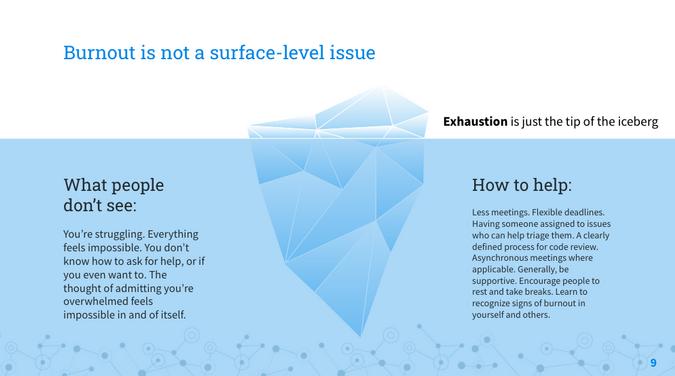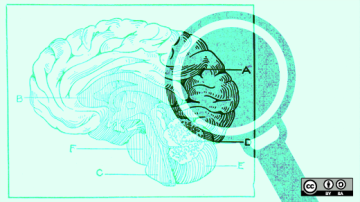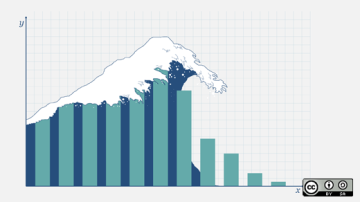Burnout is something you don't expect to happen to you—until it does. The technology industry is one of the worst offenders; over 60% of industry professionals report they've experienced burnout. Sixty percent! Chances are, you or someone you know has dealt with it. How can we tackle such a staggering burnout rate if those who make decisions about mental health barely know what burnout is, never mind how to prevent it?
The answer is to start simple. Ask the question "what is burnout?" and go from there.

(Kiran Oliver, CC BY-SA 4.0)
Autistic burnout, neurodivergence, and mental health
At Upstream 2021, the Tidelift event that kicked off Maintainer Week celebrating open source maintainers, I gave a talk about burnout in open source. The individuals who attended my presentation shared their experiences with burnout and mental health as a whole, which are undeniably linked.
Burnout manifests in cognitive, emotional, and physical symptoms. It can take on different forms that are unique to the individual experiencing it.
Also, people who are neurodivergent (e.g., have autism, ADD/ADHD, dyslexia, dyspraxia, etc.) may have standard burnout symptoms, but it can also manifest as autistic burnout, which is often harder to pin down. Crucially, burnout in neurodivergent employees can look like someone is slacking off, not doing their job, or missing important details, when none of these things are correct.
How to help people experiencing burnout
When addressing burnout on a team, managers can do a few things to ensure the team has a psychologically safe environment:
- Ask your human resources department if your insurance company offers mental health services.
- Make sure employees know about your company insurance plan's mental health benefits.
- Offer flexible time off.
- Be flexible with deadlines, if possible.
- Use asynchronous meetings.
- Embody best practices by taking time off and encouraging your team to do so.
- Learn to recognize the signs of burnout in yourself and others.
As an individual contributor, you might be wondering how you can help your teammates. Here are some things that you can do:
- Assign someone to triage issues, or implement an auto-labeling process on your team's kanban and ticketing systems.
- Make use of integrations and productivity tools.
- Automate your business processes wherever possible.
- Have a clearly defined process for code reviews.
- Encourage maintainers and contributors to take breaks.
- Understand and recognize the signs of burnout in yourself and others.
Burnout in open source communities
In open source communities, burnout can lead to not responding to pull requests or leaving issues open for an extended period of time. It can look like missing meetings, roadmap deadlines, or general forgetfulness. It can also produce emotional fatigue, anxiety, and stress, so someone might be more tired than usual or speak in a tone of voice different from their usual. They may also feel drained and lack the motivation to contribute to open source while struggling with burnout. For open source project maintainers, burnout can be a real challenge that the entire industry must continue to address.

(Kiran Oliver, CC BY-SA 4.0)
Recognizing burnout requires vulnerability on behalf of the person experiencing it as well as understanding and compassion from any person told about a team member feeling this way. If someone tells you they are burned out, respect and keep this information private. Do not broadcast it publicly, nor share it with anyone who does not need to know for official medical or legal reasons.
Key takeaways
Burnout is a genuine issue that impacts many open source practitioners. Here are some tips for how to address it in open source organizations and communities:
- Be more accepting of neurodivergence in the workplace.
- Create supportive policies and procedures for employees in your organization or open source community that may be experiencing burnout.
- If you are a contributor to a large open source project, make sure you use automation and tools that allow people to step away and take a break with ease.
- Lean on your community for support.
- Learn to recognize the signs of burnout—not only in yourself but also in others.
- Support your community, and remember that it's okay to admit to feeling burned out.
Do you have any other tips for dealing with burnout, either personally or with your open source colleagues? Please share them in the comments.











Comments are closed.